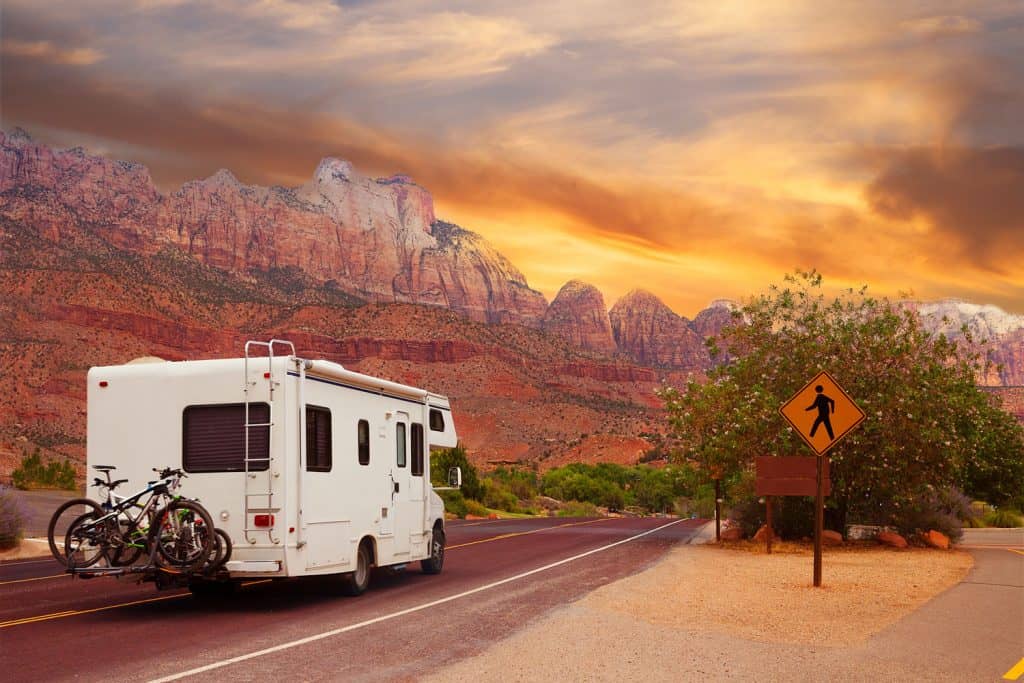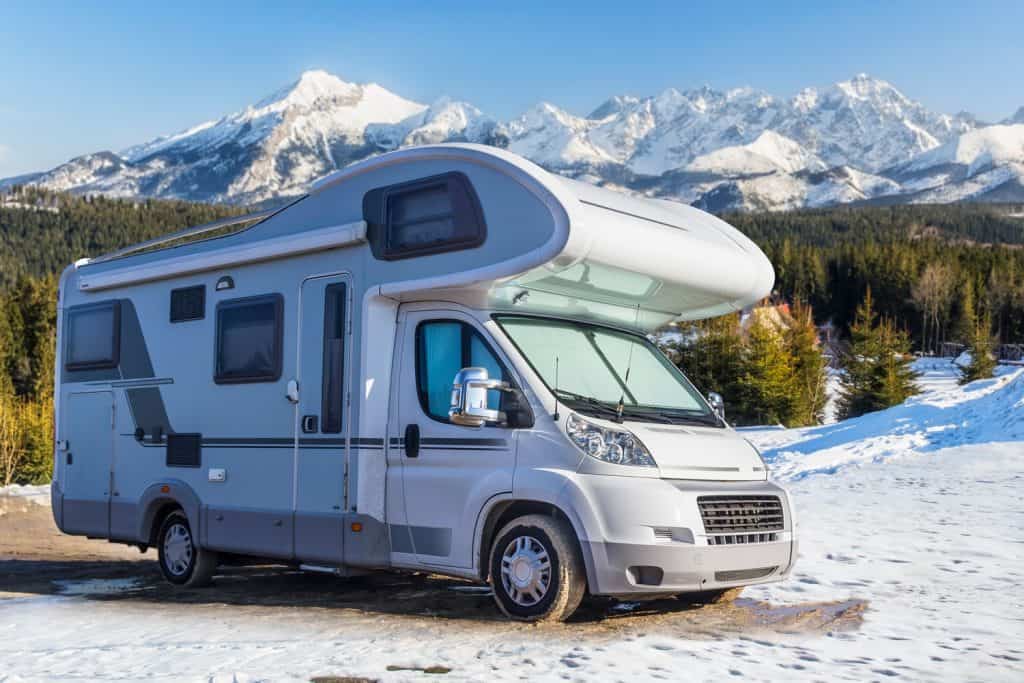Traveling across the country in your RV can be a liberating and enjoyable experience. To get the most out of your trips, proper planning is essential, especially when it comes to budgeting. Knowing the fuel economy of your rig is a fairly important part of the budget equation. If you're trying to figure out your RV's fuel consumption, beginning with how many gallons the tank will hold is a great start. We researched all classes of RVs so that you can get a definitive answer on how big your RV gas tank is.
The typical RV fuel tank capacity will depend on the class of RV. On average, the Class A RV will have a 100 gallon fuel tank, the Class B will have a 24 gallon tank, and the Class C will have a 25 gallon tank.
Now that we know the average fuel tank capacities for all three classes of RVs, we'll delve deeper into each type. You might also be wondering much much it will cost to fuel an RV, or if there is an app for RV gas stations. For the answers to these questions and more, read ahead in this post to see what we've discovered.
![An expensive looking RV parked on the camping ground of a snow trail park, How Big Is An RV Gas Tank? [By RV Type]](https://vehq.com/wp-content/uploads/2021/07/How-Big-Is-An-RV-Gas-Tank-By-RV-Type-683x1024.png)
How many miles can an RV go on a tank of gas?
There are many factors that will come into play when trying to determine the fuel economy of your RV. The weight on board, your driving habits, and the condition of the engine are some of the most significant parts of this equation. Let's assume that your RV has been well maintained, and that you will drive it at or just below the posted speed limit.
The amount of fuel economy you can expect has been listed below divided by class.
Class A RVs
These road giants are the largest in the class of RVs, and have the largest fuel tanks. Measuring up to forty feet in length, Class A RVs are big enough to be actual homes on wheels. While the mileage will vary a bit by model, you can expect to get an average range of 8 to 13 miles per gallon.
For example, this Class A RV from Newmar will get an average of 11 miles per gallon.
Class B RVs
This class of RV is also known as a camper van. They get this name because they are constructed on the standard chassis of a van. They are small, efficient, and very easy to handle. On average, the fuel economy for the Class B RV ranges between 18 and 25 miles per gallon.
The Winnebago Revel Class B RV is constructed on the chassis of the Mercedez Benz Sprinter. This model RV averages 24 miles per gallon.
Class C RVs
For those who want an RV that's smaller than the Class A, but roomier than the Class B, the Class C is the perfect fit. You'll recognize these models for their "over the cab" areas, which can be used for storage or extra sleeping space. Typically, the Class C RVs will yield 14 to 18 miles per gallon.
The Winnebago Aspect Class C RV will average 16 miles per gallon.
How much does gas for an RV cost?

The price you can expect to pay for fueling your RV will depend on several factors. The location of your fuel purchase is the most substantial here, as fuel taxes vary from state to state. The time of year is also a reason for price fluctuations; traveling in a time of year with less fuel demand will result in lower fuel cost. Finally, the type of fuel is a determining factor. While many RVs will use regular gasoline, some are equipped with engines that run off diesel.
As of July 2021, you can expect to pay between $2.75 and $2.95 in the south and midwest, and $3.40 to $4.42 in the western states, for regular gasoline. Should you be driving an RV with a diesel engine, the price per gallon range is $2.85 to $3.15 in the south and midwest and $3.65 to $4.60 in the west. Check out these nationwide gas prices, updated daily, before you travel.
Is there an app for RV gas stations?
In this age of digital apps, you are probably not surprised to find out that there are dozens of them specifically for RV travelers. While some are free to use, the best ones tend to have either a one time fee or an annual subscription amount.
The features of each app are unique, but nearly all will come equipped with GPS and maps, campground locator services, and truck stop finders.
Unless you'll use the other features that these apps offer, your smartphone or onboard technology should have all of the information you'll need for RV travel, right at your fingertips.
Does Pilot Flying J have an RV discount?
If you've spent any time doing interstate travel, you've no doubt seen signs for Pilot Flying J fuel stations. Should you be hitting the road with your RV, you might want to explore this company's RV Plus Card.
Members who hold this card will get .10 off each gallon of bulk purchase propane, half off each tank dumping fee, .05 off each gallon of regular gas, and .08 off each gallon of diesel.
The catch here is that this Plus Card is only open to members of "Good Sam Club." This campground chain membership has its own perks, and is only $29/year to join.
Is gas or diesel better for an RV?
Whether or not you choose an RV that runs on regular gasoline or one that runs on diesel will depend on how (and where) you'll be driving it. Both engine types have their respective advantages and disadvantages. Let's look closer at each engine type, so that you can make a more informed decision.
Regular gasoline
Advantages
Those who select RVs that run on regular gasoline will notice a much lower sticker price. This type of engine costs a lot less each year to maintain. Getting an RV of this type serviced is easier, as there are more locations available. Not all service stations have diesel fuel, but nearly every one has regular gasoline for purchase.
Gasoline engines also perform better in colder weather and at higher altitudes.
Disadvantages
However, regular gasoline doesn't get as good of a fuel economy. And while you'll pay less for service, the frequency of needed service is more.
A gasoline engine also has less torque than their diesel counterparts. This can mean more strain on the engine if you're climbing a mountain road, or if you're towing another vehicle behind you. The more strain on the engine, the more fuel that gets burned.
Diesel
Advantages
Fuel efficiency is a big advantage of having a diesel engine. While diesel fuel costs more, better fuel economy means less stops and more time saved.
All things considered equal, a diesel engine will far outlast one that runs off regular gasoline. They are meant to be high mileage engines, and work best for those who will put a great deal of road miles on an RV.
Disadvantages
Diesel-powered RV engines have a higher sticker price. They are also more expensive to maintain, as they require specialized service and maintenance.
In Closing
RVs are a popular way that travelers see the country. The class of RV you choose will depend on the size that you will need, as well as how comfortable you are with driving vehicles of larger size. As we've learned, these vehicles have large fuel tanks, the capacities of which are dependent upon which class of RV you select.
If you found this post on RVs to be informative, we believe you'll enjoy reading the following posts on recreational vehicles:
33 Best RV Furniture Online Stores That You Need to Know About
